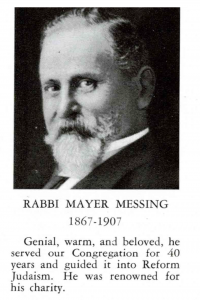
Photo info ...
(Dec. 10, 1843 – Jan. 30, 1930). Rabbi Mayer Messing was a prominent Jewish religious leader and philanthropist, best known for his 40-year tenure, extending from 1867 to 1907, at the (IHC). Under Messing’s leadership, the IHC grew from a small congregation into one of the largest Jewish congregations in Indiana. His influence extended beyond religious affairs to include significant contributions to civic and charitable causes in the Indianapolis area.
Messing was born in Genivkowa, East Prussia (now part of Poland). His family had a heritage of seven generations of rabbinical leadership in Prussia, which included his father and three brothers.
Messing was trained by prominent rabbinic scholar Eliyahu Guttmacher of Graetz. After his religious studies, Messing served briefly as a cantor and religious schoolteacher. In 1860, he was appointed Rabbi of Mecklenburg-Schwerin and four years later succeeded his father as the Rabbi of Gostyn, now in Poland.
When the Austro-Prussian War began in 1866, Messing enlisted in the Prussian army. Soon thereafter, Messing read an ad in Die Deborah—a Reform movement Jewish newspaper published in Cincinnati, Ohio—stating that Indianapolis’s IHC needed a rabbi. He contacted Ohio rabbi Isaac M. Wise, credited with bringing Reform Judaism from Germany to the United States and founding the movement’s American branch. Wise secured leadership of the IHC for Messing. With the job in hand, Messing managed to obtain a release from the military to emigrate to the United States.
In May 1867, Messing arrived in New York, and within a month he continued on to Indianapolis to take up his IHC role. At the time, the congregation was small, Orthodox, and composed primarily of German-speaking Jews. Though initially speaking little English, Messing quickly adapted to his new environment and became a central figure in the community. Under his leadership, the IHC grew significantly, and he oversaw the construction of two synagogues: one on Market Street in 1868 and another on North Delaware Street in 1899.
Beyond his IHC duties, Messing expressed dedication to local civic causes. He was the first president of the Indianapolis Humane Society, one of the founders of the Fresh Air Mission, and a member of the Indiana branch of the Red Cross. He supported the creation of the Industrial Home for the Blind and was actively involved with B’nai B’rith and the Masons (see ). Messing also served as the secretary of the Hebrew Ladies’ Benevolent Society for 27 years and assisted people in need through his work with charity organizations.
In 1888, Messing made headlines for publicly defending former Union general Alvin Hovey, a candidate for governor of Indiana, against accusations of antisemitism. Some Jewish Indianans criticized Messing’s defense of Hovey, who had allegedly made public remarks disparaging Jews during the , though Messing argued that Hovey’s views had changed.
Messing retired from his IHC position in 1907 after four decades of service, but he remained active in local Jewish community affairs until his death. He is remembered as a pioneering figure in the Jewish community who made lasting contributions to Indianapolis’s religious and social institutions.
CITE THIS ENTRY
APA:
Brown, M. (2025). Mayer Messing. Encyclopedia of Indianapolis. Retrieved Feb 21, 2026, from https://indyencyclopedia.org/mayer-messing/.
MLA:
Brown, Michael J. “Mayer Messing.” Encyclopedia of Indianapolis, 2025, https://indyencyclopedia.org/mayer-messing/. Accessed 21 Feb 2026.
Chicago:
Brown, Michael J. “Mayer Messing.” Encyclopedia of Indianapolis, 2025. Accessed Feb 21, 2026. https://indyencyclopedia.org/mayer-messing/.

Help improve this entry
Contribute information, offer corrections, suggest images.
You can also recommend new entries related to this topic.